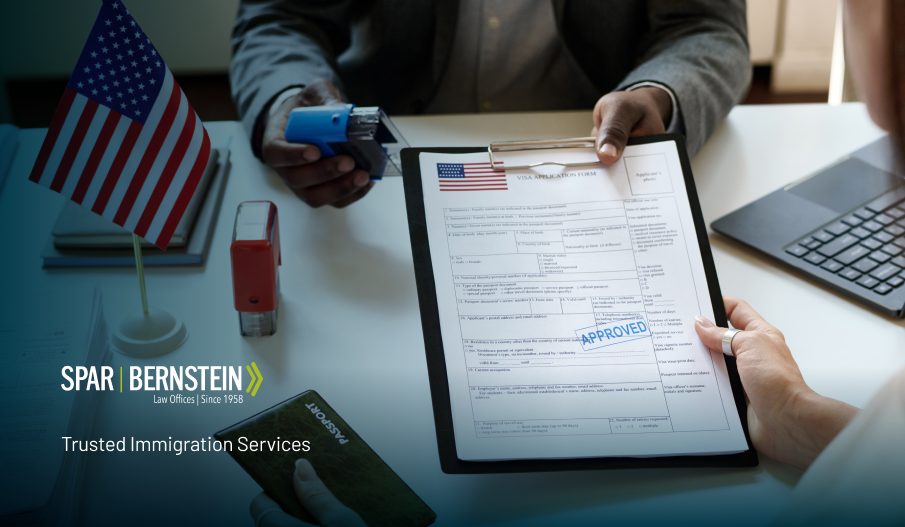

Are you looking to bring skilled professionals to the United States or move key employees from your international offices to the U.S.? If so, you may face various legal issues in the process.
In this article, you will:
- Learn about the key challenges of cross-border employment.
- Understand the role of an immigration lawyer in the process.
- Find answers to frequently asked questions.
- Discover how Spar & Bernstein can support you.
Cross-Border Employment: Legal Challenges
Hiring foreign workers can help your company grow. However, you should be aware of the legal challenges it entails.
Work Permits & Visas
Obtaining the right visa is the first step to bringing foreign employees to the U.S. You can do this through various work visas, for example:
- H-1B visa: Allows you to hire skilled professionals in specialized fields such as IT, finance, and engineering. To apply for this visa, you must demonstrate the job requires specialized skills and the employee has the necessary qualifications.
- L-1 visa: Facilitates intra-company transfers, allowing you to move employees who work in other countries to the company’s U.S. offices. You must prove the employee has worked abroad for at least one year within the past three years in an executive, managerial, or specialized knowledge role.
- O-1 visa: Designed for individuals with extraordinary abilities in sciences, arts, education, or business. You must provide documents proving the employee’s exceptional qualifications.
Obtaining the wrong visa may result in employee deportation, loss of work authorization, and penalties for you as an employer.
Tax Compliance
As an employer, you must comply with Federal Insurance Contributions Act (FICA) tax requirements and contribute to Social Security and Medicare.
This is valid for all your employees, including foreign workers unless the latter qualify for an exemption based on their visa type.
To stay compliant with cross-border employment regulations, you should:
- Review tax treaties between the U.S. and the employee’s home country to avoid double taxation.
- Understand state tax obligations that may vary on location.
- Classify workers correctly and stay up to date on federal and state tax regulations to avoid penalties.
Employment Law Compliance
When hiring foreign workers, you must ensure foreign employees get the same protections and benefits as domestic workers.
This includes:
- Equal employment opportunities, which prohibit discrimination based on race, national origin, religion, disability, or other characteristics.
- Entitlement to the same minimum wage for their occupation and location, overtime pay, and working hours protections as U.S. workers.
- Safe working environment as per Occupational Safety and Health Administration (OSHA) standards.
Your contractual agreements with foreign workers should clearly outline the terms of employment, including whether the role is at-will or based on a fixed-term contract — especially if the worker’s visa is tied to the job.
For certain visa categories like H-1B, you must file a Labor Condition Application (LCA) with the U.S. Department of Labor to demonstrate compliance with wage and working condition requirements.
Data Protection
Hiring foreign talent requires you to follow federal and state data protection and privacy regulations, just as you do for U.S. workers. This is especially important when handling personal information such as:
- Passport details
- Visa documents
- Social Security numbers
- Form I-9, Employment Eligibility Verification, and supporting documents
If the employee’s home country requires cross-border data protection compliance, you must comply with international data protection standards, such as the General Data Protection Regulation (GDPR).
Dispute Resolution
Hiring foreign workers may sometimes lead to disputes over wages, termination, or contract terms.
To be prepared, you must establish clear resolution mechanisms, such as:
- Arbitration agreements: Contracts that require resolving disputes privately through arbitration instead of going to court.
- Choice of law provisions: Clauses that decide which country or state’s laws will apply to the contract.
- Mediation & settlement negotiations: Alternative dispute resolution methods to settle disputes without legal action.
Moving To A Green Card
Certain employment-based visas — such as the H-1B and L-1 — allow for dual intent, meaning your employees can apply for a Green Card after receiving the visa.
In this complex process, depending on the specific case, you may need to:
- Go through a labor certification process, proving there are no available qualified U.S. workers for the position.
- Ensure the foreign worker has a valid visa during the Green Card application process.
- Complete and file extensive documentation.

The Role Of An Attorney In Cross-Border Employment
Working with experienced lawyers can have many benefits if you are planning to hire foreign talent.
They will:
- Advise on the right visa category and ensure your company meets visa requirements as an employer.
- Help prepare and submit your applications along with supporting and required documentation.
- Help your employees apply for an employment-based Green Card when the visa category allows it.
- Keep you updated on employee-related immigration law trends.
- Draft contracts that comply with U.S. employment laws and include clauses to help with employment-related disputes.
- Provide guidance on payroll tax withholding, Social Security contributions, and applicable tax treaties.
- Advise on terminating foreign workers in line with employment laws and visa requirements.

Cross-Border Employment: Key Takeaways
Cross-border employment is a complex process that poses various challenges. Here are five points to keep in mind:
- Ensure your employees are authorized to work in the U.S.
- Understand federal, state, and international tax obligations, along with tax treaty benefits.
- Follow U.S. labor laws concerning wages, working hours, and non-discrimination.
- Protect employee personal data by observing privacy regulations.
- Work with an immigration attorney to avoid complications and ensure a smooth process.
Why Work With Spar & Bernstein On Cross-Border Employment
With over 60 years of immigration excellence, Spar & Bernstein has been a trusted legal partner for companies interested in employing foreign talent.
We have 100,000+ successfully handled individual and business cases and a 97% client approval rating, reflecting our deep knowledge and commitment to our clients.
Work with our tenacious team of attorneys and benefit from tailored workforce solutions and full legal support every step of the way, from visa applications to Green Card assistance.
Cross-Border Employment: FAQs
If you have concerns about cross-border employment, explore our list of frequently asked questions below.
How long does it take to obtain a work visa for a foreign employee?
Processing times for work visas may vary depending on the visa type.
- H-1B visas are subject to visa availability and can take several months.
- L-1 and O-1 visas can take weeks to months depending on whether you want to use premium processing.
How can I avoid double taxation for my foreign workers?
To avoid double taxation for your foreign employees, review tax treaties between the U.S. and the employee’s home country and ensure proper tax planning. Working with experienced cross-border employment lawyers can help ensure you have all the necessary information in place while managing your business operations.
What will happen if I terminate a foreign employee?
If you terminate a foreign employee, this can affect their visa status. For example, if they have a H-1B visa, they have 60 days to find a new employer or they must leave the U.S.













